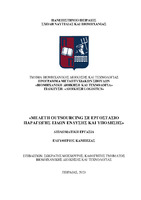Μελέτη outsourcing σε εργοστάσιο παραγωγής ειδών ένδυσης και υπόδησης
Outsourcing study in a clothing and footwear manufacturing factory

Προβολή/
Λέξεις κλειδιά
Outsourcing ; Συμπαραγωγή ; Κρίσιμες δραστηριότητες ; Μοναδικές ικανότητεςΠερίληψη
Το outsourcing, αποτελεί σημαντική διαδικασία επιχειρηματικής στρατηγικής και κοινή πρακτική, τόσο των ιδιωτικών, όσο και των δημόσιων οργανισμών. Όλο και περισσότεροι οργανισμοί αναθέτουν πλέον σε εξωτερικούς συνεργάτες δραστηριότητες που συνήθιζαν να εκτελούν ενδοεπιχειρησιακά. Οι διαφορές έγκεινται στο είδος των δραστηριοτήτων που ο κάθε οργανισμός προτίθεται να αναθέσει σε εξωτερικούς συνεργάτες, στα κίνητρα για τη λήψη απόφασης outsourcing και στον τρόπο με τον οποίο υλοποιείται. Μέσω μιας επιτυχημένης εξωτερικής ανάθεσης, οι επιχειρήσεις προσδοκούν να αποκομίσουν το δυνατόν περισσότερα οφέλη. Ωστόσο, χρειάζεται να έχουν υπόψη ότι μια τέτοια διαδικασία παρά τα σημαντικά οφέλη μπορεί να κρύβει και ενδεχόμενους κινδύνους.
Με την παρούσα εργασία επιχειρείται η ανάλυση της στρατηγικής της ανάθεσης δραστηριοτήτων μιας επιχείρησης σε εξωτερικούς συνεργάτες, βασιζόμενη στην υπάρχουσα για το θέμα βιβλιογραφία. Σκοπός της εργασίας είναι, η ανάδειξη των πλεονεκτημάτων που δύναται να αποκομίσει ένας δημόσιος οργανισμός, αναθέτοντας μη κρίσιμες δραστηριότητές του σε ιδιωτικές επιχειρήσεις, αλλά και της πληθώρας προβλημάτων και νομικών περιορισμών που υφίστανται σε αντίστοιχες συνεργασίες. Πιο συγκεκριμένα, στο πρώτο κεφάλαιο της εργασίας παρουσιάζονται οι βασικότεροι ορισμοί του θεσμού, η εξέλιξή του και οι συνηθέστερες μορφές που δύναται να λάβει. Στη συνέχεια καταγράφονται τα κίνητρα για την υιοθέτηση στρατηγικής outsourcing, τα αναμενόμενα οφέλη από το συγκεκριμένο εγχείρημα, αλλά και οι δυνητικοί κίνδυνοι, που σχετίζονται με αυτό. Μεταξύ πρόθεσης υιοθέτησης outsourcing και τελικής εφαρμογής του, παρεμβάλλεται μια σειρά διαδικασιών και παραγόντων που πρέπει να ληφθούν υπόψη, προκειμένου να καταστεί επιτυχημένο. Τέλος, στο τρίτο κεφάλαιο, παρατίθεται η μελέτη περίπτωσης ανάθεσης σε εξωτερικό συνεργάτη, μέρους της παραγωγικής διαδικασίας του 700 Στρατιωτικού Εργοστασίου και η σύγκριση κόστους – οφέλους προκειμένου να αναδειχθούν οι διαστάσεις της εφαρμογής outsourcing στην πράξη.


